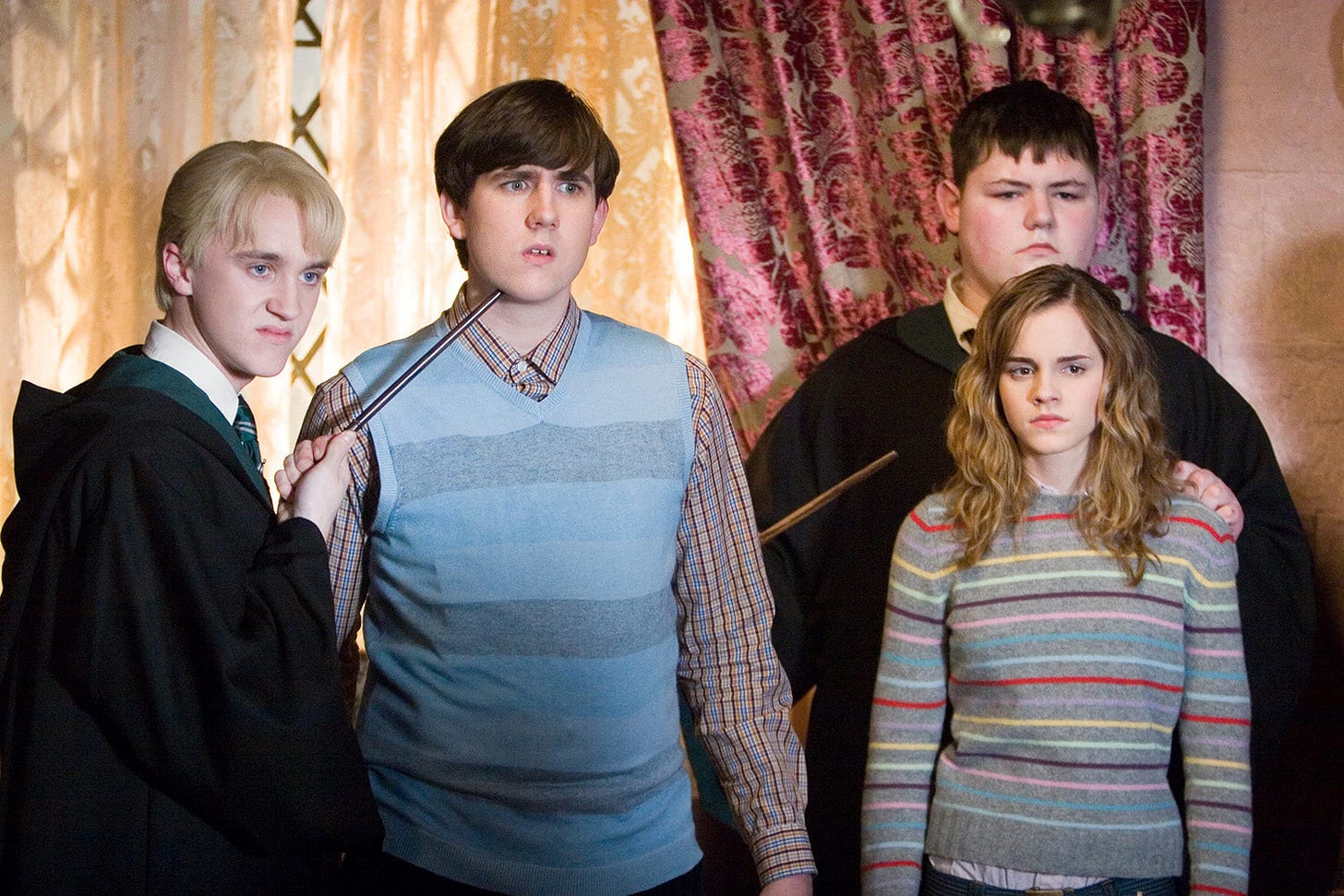Why Nobody Thinks They Are The Draco Malfoy of Their Own Story
How Bullies Use Psychological Defense Mechanisms to Defend Their Actions
No, this isn’t about video games. This time, we’re diving into the psychology of fictional villains and bullies. As a mental health professional, I love exploring the intersection of “nerd culture” and psychology, and what better subject than one of fiction’s most iconic bullies: Draco Malfoy.
This Is Draco Malfoy Before the Redemption Arc—Feel Free to Insert Your Preferred Fictional Bully
Do you remember the kid who bullied you in school? The one who made your life miserable? Now, here’s a harder question: could you have been that obnoxious bully for someone else? Impossible, right? It can’t be true that you, a self-proclaimed good person, might have been that kid.
Here’s the reality: most middle schoolers are, well, animals. We’ve all said or done something stupid at some point. That’s where the first Harry Potter book starts, isn’t it? One of our first introductions to Draco Malfoy comes with this line:
"Think my name’s funny, do you? No need to ask who you are. My father told me all the Weasleys have red hair, freckles, and more children than they can afford."
So, why do we all see ourselves as the Harry Potter of the story? It can’t be true that every kid who related to Harry actually exhibited his selfless, brave, and noble characteristics, right? And what about the snot-nosed kids we grew up with?
Did you know they often don’t see themselves as the bully in their own narrative? Unless they’re diagnosed with antisocial personality disorder, chances are they don’t see themselves as Draco Malfoy at all. So, what’s the deal?
FYI: Mental Health Professional Here—No Backseat Instagram Self-Diagnosis Psychology
First, let’s unpack why Draco acts the way he does. Obviously, we’re speculating here, but it’s speculation based on 1,084,170 words across the Harry Potter series. As far as I can tell, Draco’s behavior is shaped by three things: societal pressure, family expectations, and his own insecurities.
Like all of us, Draco employs psychological defense mechanisms to protect himself. One of the most common is rationalization. Rationalization isn’t necessarily a bad thing—it helps us preserve our ego and make sense of setbacks. For example:
"I didn’t do well on the test because I didn’t study much. If I had studied more, I could have done better."
This kind of reasoning can even motivate us to work harder next time. But rationalization can also be used to justify far darker behavior, from historical atrocities to your childhood bully’s toilet swirlies.
Draco rationalizes his bullying of Ron and Hermione by framing it as a defense of "wizarding purity" and a way to enforce societal norms he believes in.
"No one asked for your opinion, you filthy Mudblood," he sneers.
Now, pause and think about how often we rationalize our own actions against others by labeling them as “different” or “less than.” Not sure if you’ve ever done this? Time for some self-reflection, because chances are, you have. Maybe it was something as petty as being part of the field hockey team that made snide remarks about the softball team. Rationalization is easy—and it’s everywhere.
This is where you (hopefully) realize that most people don’t fall neatly into the categories of “good” or “evil.” We all live in the gray. Any “good” person is capable of terrible actions, just as any “bad” person is capable of kindness.
The One Thing Draco Lacks
Draco’s defining flaw is his lack of outwardly expressed empathy. He doesn’t seem capable of considering how his actions affect others. When Draco is hurt or scared, his first instinct is retribution.
Take Buckbeak, for example. After being bitten by the creature due to his own stupidity, Draco creates an elaborate scheme to have it executed—Hagrid’s feelings and the creature’s life be damned.
This absence of empathy is something many childhood bullies share.
Narrative Framing and Villains
Now, let’s talk about narrative framing. In The Half-Blood Prince, Draco is tasked with repairing the Vanishing Cabinet to allow Death Eaters into Hogwarts—a mission given to him by Voldemort himself. Draco frames this task as an act of familial duty and survival.
Think about that for a second. How many villains, both fictional and historical, have reframed their actions under a different narrative? How often do they tell themselves, I’m doing this for the greater good, or, This is the only way to protect my people?
We rationalize. We frame our actions in ways that make sense to us, even when those actions hurt others. And more often than not, the villain of someone else’s story doesn’t even realize they’re playing the part.
If you enjoy exploring the deeper stories behind the games we play, the characters we love (or love to hate), and the quirky subcultures that make up nerd culture, then this Substack is for you. I write about the psychology of gaming, villains, and the way our hobbies shape who we are. From nostalgic deep dives to thoughtful reflections, every article is here to spark curiosity and conversation. Subscribe to join a community of gamers and nerds who love to geek out about the "why" behind the things we love!







You know, I get the feeling you’d love my series on psychology and video games! Volume 3, deep in the archive. I can even comp you a subscription if you’d like!